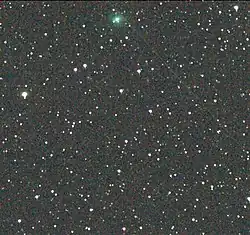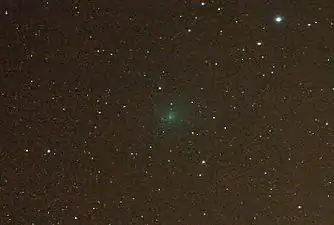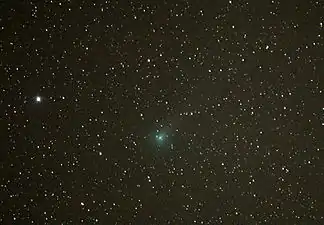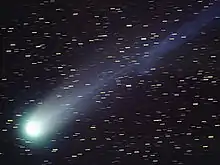 Comet C/2007 E2 (Lovejoy) discovery frame | |
| Discovery | |
|---|---|
| Discovered by | Terry Lovejoy |
| Discovery date | 15 March 2007 |
| Orbital characteristics | |
| Epoch | 2454230.5 (10 May 2007) |
| Aphelion | 1838 AU (inbound) 1554 AU (outbound)[1] |
| Perihelion | 1.09294 AU |
| Eccentricity | 0.999233 |
| Orbital period | ~28000 yr (inbound) ~22000 yr (outbound)[1] |
| Inclination | 95.8835° |
| Last perihelion | 27 March 2007 |
C/2007 E2 (Lovejoy) is a non-periodic comet discovered by Terry Lovejoy on 15 March 2007. Its perihelion was 27 March 2007, while its closest approach to Earth was 25 April 2007 in Hercules at a distance of 0.44 AU. Maximum apparent magnitude was approximately +8.[2]
The discovery was made using a Canon EOS 350D consumer grade digital camera, and not a CCD survey camera.[3]
Image gallery
 C/2007 E2 on 21 April 2007 from Mount Laguna, California
C/2007 E2 on 21 April 2007 from Mount Laguna, California Sporting a vague tail to the 2 o'clock on 9 May 2007 from Mount Laguna. The star is Mu Draconis (mag 4.90)
Sporting a vague tail to the 2 o'clock on 9 May 2007 from Mount Laguna. The star is Mu Draconis (mag 4.90)
References
- 1 2 Horizons output. "Barycentric Osculating Orbital Elements for Comet C/2007 E2 (Lovejoy)". Solution using the Solar System Barycenter. Ephemeris Type:Elements and Center:@0 (To be outside planetary region, inbound epoch 1950 and outbound epoch 2050)
- ↑ Yoshida, Seiichi. "C/2007 E2 ( Lovejoy )". Aerith.net.
- ↑ Drummond, John. "Comet 2007 E2 (Lovejoy) - Photos and Observations". Possum Observatory. Archived from the original on 29 March 2007. Retrieved 26 March 2007.
External links
![]() Media related to C/2007 E2 (Lovejoy) at Wikimedia Commons
Media related to C/2007 E2 (Lovejoy) at Wikimedia Commons
- C/2007 E2 at the JPL Small-Body Database Browser
- C/2007 E2 at Cometography.com
- C/2007 E2 moving amongst the stars (video in WMV format)
This article is issued from Wikipedia. The text is licensed under Creative Commons - Attribution - Sharealike. Additional terms may apply for the media files.

.png.webp)